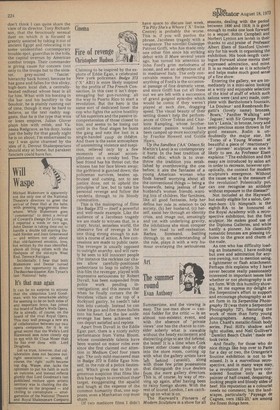Cinema
Fire of revenge -,
Christopher Hudson
Claiming to be inspired by the exploits of Eddie Egan, a celebrated New york policeman. Badge 373 ( X ' ABI) is more likely inspired by the profits of The French Connection. In this case it isn't dopesmuggling but gun-running: all the way to Puerto Rico to start a revolution. But the hero is the same sort of dedicated loner: the cop who fights the active hostility of his superiors and the passive incomprehension of those closest to him, and seems to be losing out until in the final stages he busts the gang and nets the loot in a sin gle.handed coup de thkttre. And there is the same atmosphere of unremitting violence and suspicion, relieved only by a few moments of sexual accomplishment on a creaky bed. The best friend has his throat cut; the witness has her face blown away; the girlfriend is gunned down; the policeman survives, beaten up, bruised and cursing, not to see justice done, not to uphold the principles of law, but to take his personal revenge and follow the vendetta through to its bloody culmination This is the mainspring of films like Budge 373 — itself a powerful and well-made example. Like the audience of a Jacobean tragedy we are made to witness that, in a crazy, brutal, senseless world, the obsessive fire of revenge is the one thing strong enough to sustain a course of action. A few concessions are made to public taste. The revenger is usually opposed to outright anarchy, and will rarely be seen to kill innocent people (for instance the reckless car cha
ses • allow carefully-positioned pedestrians to leap to safety). In this film the revenger, played with impressive seriousness by Robert Duvall, has been suspended from police work pending investigations; and this means that when he finally corners the defenceless villain at the top of a dockyard gantry, he needn't take him into custody. Instead he can raise his gun and fire three bullets into his heart. Let the law aside: revenge has been achieved: we can depart satisfied and replete.
Apart from Duvall in the Eddie Egan part, there is a nicely sultry performance from Verna Bloom, whose considerable talents have been wasted on minor roles ever since she first claimed our attention in Medium Cool four years ago. The only mild-mannered man in Badge 373 is Eddie Egan himself, in the role of a police lieutenant. Which gives rise to the ungenerous suspicion that films like this have begun to overshoot their* target, exaggerating the squalid and tough at the expense of the common humanity that, one supposes, even a Manhattan cop must share.
Of two mediocre films I didn't
have space to discuss last week, 'Tis Pity She's a Whore X 'Swiss Centre) is probably the worse, This is, if you will pardon the phrase, Jacobean tragedy with a vengeance. The novelist Guiseppe Patroni Griffi, who has made only one other film since his striking debut with I/ Mare several years ago, has turned his attention to John Ford's grim melodrama of incest, and set an adaptation of it in mediaevel Italy. The only conceivable reason for resurrecting anything of Ford's is the occasional passage of fine dramatic verse, and since Griffi has cut all these out we are left with a succession of grand guignol episodes which would be comic if they weren't played at such dire, dragging speed. The visual beauty of their setting doesn't help the performances of Oliver Tobias and Charlotte Rampling, whose brotherand-sister passion would have been camped up more successfully by Frankie Howerd and Goldie Hawn.
Up the Sandbox ('AA' Odeon St Martin's Lane) is so contemporary -it hurts. In the best tradition of radical chic, which is to overthrow the tradition you established by overthrowing the one before, it airs the fantasies of a young American woman who finds herself worrying about all the conventional things — being a housewife, being jealous of her husband's women friends,wanting lots of children. Her fantasies, like all good fantasies, help her define her role in relation to (a> society, (b) her husband, (c) herself, assist her through an identity crisis, and image out, amusingly and yet with underlying gravity, the inhibitions she must conquer on her road to self-realisation.
Barbra Streisand, battling through to an understanding of the role, plays it with a wry humour overlaying the seriousness.
































 Previous page
Previous page